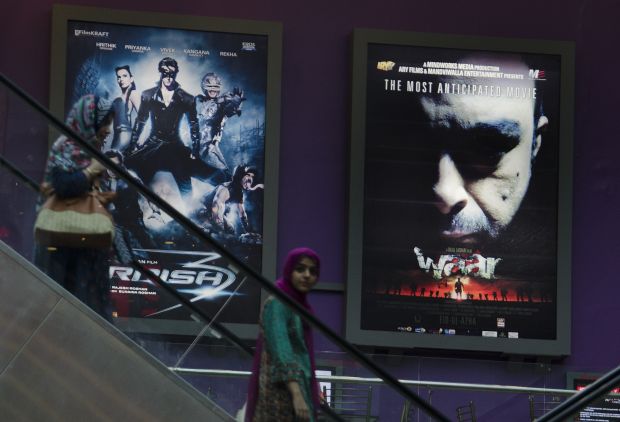
In this photo taken on Thursday, October 31, 2013, people leave theatre after watching the Pakistani movie Waar in Islamabad, Pakistan. (AP Photo/B.K. Bangash)
Islamabad, Asharq Al-Awsat—If Pakistan’s movie industry has been on life support for a decade, then 2013 was the year that the patient woke up. This year saw the release of a number of Pakistani blockbusters which not only garnered critical acclaim but also broke box office figures.
Pakistani action thriller Waar (“attack” or “strike” in Urdu), was one of the films of the year. Waar is set during the Pakistani security forces’ operations against terrorists and militants over the last ten years of the War on Terror and tells the story of a retired Pakistani army officer who is brought back in from the cold for one last operation.
The film’s producers told Asharq Al-Awsat that the movie is a reflection of real-life events, narrating actual Pakistani security operations carried out in different parts of the country.
The movie begins with scenes based on the true events of an operation carried out by Pakistani security forces in the north of the country to secure the release of a Chinese engineer from the custody of tribal militants.
The bilingual movie, containing scenes in both English and Urdu, reportedly did record business over the three days of Eid this year, witnessing ticket sales worth 40 million Pakistani rupees.
This is the largest box office over the Eid holiday period in Pakistani history, and represented a convincing victory over star-studded Indian movie Boss, which took in 10 million Pakistani rupees over the same period.
Waar’s producers informed Asharq Al-Awsat that the movie has broken a number of records, with a total box office taking of almost two million US dollars to date. They are planning to present it to international audiences.
“After the gigantic success of Waar in Pakistan, we are now going to take it to the global stage. I believe that Waar has started a new era where we will be making world class movies and our talent will be appreciated,” said Islamabad-based film critic Sardar Shahab.
Waar was not the only domestically produced movie to enjoy popular appeal. Urdu-language movie Bol (meaning “speak” in Urdu) also witnessed huge box office sales. The movie deals with a controversial subject manner, including a major transgender story-line.
These two big successes for the Pakistani movie industry in 2013 have raised hopes of a movie-making resurgence in the country.
Over the past two decades, the Pakistani film industry has been in a state of decline due to a lack of private-sector funding and an absence of both on-screen and off-camera talent. This is not to mention the complete domination of the Indian film industry over the same period.
“The Pakistani film industry is practically dead,” said Shahab. “It has been dead for years. There is a steady flow of Indian movies so no one has ever felt the need to revive the Pakistani film industry,” he added.
Pakistani film critics view 2010 as being the nadir of the Pakistani movie industry with a total of just seven movies being produced, six of which were major flops. However this can be traced back to the 2009 Taliban-led attacks on cinemas and movie studios in Pakistan.
The city of Lahore, the heart of Pakistan’ movie industry, witnessed a spate of suicide bombings and terrorist attacks targeting cinemas and movie studios.
“The Pakistani film industry has been squeezed to death because of pressure from two sides, one is the flooding of the Pakistani market by better quality Indian movies, and second is the terrorist attacks coming from the Taliban side” said Shahab.
Indian movies have been immensely popular in Pakistani society since the 1980s, particularly thanks to the proliferation of cheap VHS from across the border. In the 1970s Pakistan had a vibrant industry, competing even with India’s Bollywood. However it was struck hard after the government withdrew its support, imposing some cultural restrictions on what was allowed to be shown.
In recent years, Pakistani studios have sought to revive the flagging film industry, but on a smaller scale, devoting efforts to specific projects. “Movie studios made very good attempts to revive the industry but they are on a very small scale, I mean producing one movie in four years could at best be described as small scale,” said Shahab.
“On the other hand if you look at the Indian movies being imported into Pakistan, they are importing around four movies per month into Pakistan,” he added.
A partial ban on Indian movies was relaxed in 2006 following improving relations between Islamabad and New Delhi as a result of ongoing dialogue which focused not just on politics, but also improving cultural relations between Pakistanis and Indians.
In 2006, the government of Pakistan decided to allow three Indian movies to be screened in Pakistan every month, according to officials.
Since that time, the cultural scene in Pakistan has witnessed something of a revival. Experts believe that Indian movies brought more Pakistanis to the cinema, which in turn would have a positive influence on local movie-making.
“More screening will give a boost to the Pakistani film industry and it will help revive the cinema-going culture in Pakistan which is on the brink of shutting down,” said Pakistani distributing company founder and cinema owner Nadeem H. Mandviwalla.
Mandviwalla revealed that in the 1980s there were some 1,400 cinemas in Pakistan, while today that number is closer to 250.
“Over the last four years I have become a regular cinema goer after the government allowed the screening of Indian movies, but before that I was more interested in watching movies at home” Khawar Riaz, a middle class professional, told Asharq Al-Awsat outside a cinema in Islamabad.

Really nice movie well done Bilal lashari